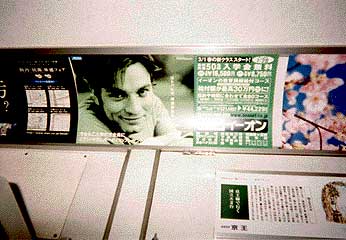by Sara Ellis
|
Discrimination against Asian foreigners even manifests itself in social situations. "There are twenty-two people in my study program, most of the students are white foreigners," says Val Wong, a Chinese Canadian student. "The treatment we get from Japanese people in or outside school is totally different. First of all, when we meet a group of Japanese people in a party or something, they would for sure chat with the whites first. Next thing is that when I'm with my boyfriend, a Caucasian, and whenever he bumps into his Japanese friends on the street or the train stations, they would just talk to him without paying any attention to me." Foreigners of Asian backgrounds like Wong also often have to deal with a frustrating expectation to conform to Japan's rigidly conformist social demands. Like the other students in her program, Wong chose to stay with a Japanese host family. One night when she informed them that she would be visiting the home of a male acquaintance, she got an unexpected earful of paternalism. "He started giving me a whole twenty minute lecture on how inappropriate it is for a girl to go over to a guy's house that late at night, Wong says. "I don't know if I was just paranoid, but I assume that the situation would have been different if I were a white person. I mean, he totally treats me like a Japanese daughter." Along with many other Asian foreigners living in Japan, Wong has found herself exempt from something called "gaijin license," a term coined by sansei (third generation Japanese American) author David Mura in his memoir "Turning Japanese." In the book Mura describes how foreigners, by virtue of their difference, are often excused from the unwritten rules of Japanese behavior while ethnic Japanese raised abroad are not. While Mura's Caucasian friends might casually cross at a red light, Mura would often feel inhibited from breaking the rules by the presence of Japanese people around him. This discrimination is more disturbing in the official arena. In a speech to the Jietai (Japan's self-defense forces) Tokyo's nationalist governor, Shintaro Ishihara, warned forces to prepare themselves in the case of a natural disaster as foreigners were likely to riot. But the actual Japanese words he used add insult to injury in this scenario. Although many English newspapers translated the governor's word as simply "foreigners," Ishihara used the term "sangokujin," a derogatory reference to people from third world Asian countries, and ethnic Koreans. Japan has nearly 600,000 Korean nationals residing within its borders, many of them third generation. These people pay their taxes, take Japanese names, and many can't speak anything but Japanese. But they are still unable to vote in even local elections. Their schools are still unrecognized by Japan's Ministry of Education, and up until last year they were uniformly fingerprinted by the government. Although ethnic Koreans are given the option to become full-fledged Japanese citizens, the government does not allow dual-citizenship, making many reluctant to give up their own national identity. Although attitudes aren't changing as fast as they could be, there are signs of hope. Foreigners no longer feel as if they have to put up or ship out when it comes to discrimination. And the courts are beginning to agree with them. In 1998, a Brazilian journalist and long time resident Anna Bortz was escorted out of a jewelry store in Hamamatsu city after telling the shop owner of her nationality. When the police refused to intercede on her behalf, Bortz took the case to court on a charge of racial discrimination and won. Bortz's lawyer argued that although Japanese law does not forbid discrimination on the basis of race, a UN treaty signed by Japan in 1996 does. Bortz was awarded $15,000, a decent sum in a country not known for its generous litigation damages.
|
